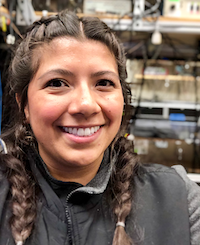Whether you’re in high school or college, there will be times when learning feels amazing, and times when it’s a humbling experience. But it will always be worth the effort. So what’s the secret to achieving your personal best? While there’s no simple formula, most teachers agree that certain qualities are essential for academic success. Here are some of their pro tips.
Show Up and Manage Your Time
Let’s begin with a couple of basics: Go to class and pay attention. Getting there on time shows respect for your teacher and your peers. Manage your time so you can get to school, keep your focus when you’re there, and do the homework and studying necessary to perform well. Once you’re in class, tune in. Keeping your focus can be tough when there are so many potential distractions, from social media to your personal life. If you feel your mind beginning to wander, rein it in.
As educator Jerome Breitenbach explains, it’s all about the basics. "Good time management requires not taking on more than you can handle, reasonably estimating the time you need, and actually doing what needs to be done." As a professor emeritus in California Polytechnic State University’s Electrical Engineering Department, he’s also quick to emphasize your accountability as a student: "Only you can do these things."
Work Hard
Being smart is an asset for any student, but the best students aren’t necessarily the most brilliant — they’re the ones with the self-discipline to sharpen and apply their intelligence. One of the smartest things you can do is approach schoolwork with a sense of commitment. Hard work is something teachers will always notice. This means completing assignments on time, being prepared for tests and quizzes, and always looking for ways to improve.
In fact, a recent academic study concluded that how students behave in school predicts life success above and beyond factors like family background and cognitive ability. In a Project Talent study reserachers found that students who are responsible and have solid reading and writing skills are more likely to succeed in college and go on to higher-paying jobs than their less-diligent classmates.
Ask Questions
Any dedicated teacher will tell you they want students to ask questions. More importantly, If you don’t ask questions, the teacher is left to assume that you understand what’s being taught. If you don’t understand something and you don’t speak up, you can run into trouble when new lessons build on the concepts that never made sense to you in the first place.
"Overall, there’s one basic trait that distinguishes successful students," says Breitenbach. "Successful students force themselves to understand." He points out that the best students don’t expect that attending class, reading the textbooks, and doing the homework will be enough. Instead, they continually ask themselves whether they really understand what's going on.
Stay Motivated
This one may not be as easy as it sounds. Inevitably, students encounter obstacles and even setbacks. What matters is how you handle the hurdles you encounter. “Failure is one of the greatest tools in the learning process," says educator and researcher Linda Stade. "Unfortunately, too many people are so overwhelmed by the feeling of failure they aren’t able to stand back and look at the lessons it can teach. Having the tenacity to stare down failure is an extraordinary skill."
Another tip from Breitenbach: "Form a positive self-image. Students who are first entering college will probably have doubts about how well they will do. Try to do well immediately to instill an expectation of continuing to do well. Don't be restricted by your past performance and experiences, good or bad."
Staying on your academic path will require resilience. There will be moments when the world becomes bigger and better because of something you just learned; there will be moments when you are tested. But if you can show up, work hard, ask questions, and persist, the rewards of education will be waiting for you.
On Topic
 Maryrose Barrios is a physics PhD student at the Georgia Institute of Technology. Her research is within the field of atomic physics, where she studies the quantum effects of ultracold atoms. An aspiring professor, she’s also committed to helping advance underrepresented students in STEM through education. Maryrose is a member of the Tule River Band of Yokuts in California. She has been a member of AISES since her undergraduate years at UC Berkeley. When she’s not in the lab, she enjoys hiking with her dog, scuba diving, and playing on the Georgia Tech Women’s Water Polo Team.
Maryrose Barrios is a physics PhD student at the Georgia Institute of Technology. Her research is within the field of atomic physics, where she studies the quantum effects of ultracold atoms. An aspiring professor, she’s also committed to helping advance underrepresented students in STEM through education. Maryrose is a member of the Tule River Band of Yokuts in California. She has been a member of AISES since her undergraduate years at UC Berkeley. When she’s not in the lab, she enjoys hiking with her dog, scuba diving, and playing on the Georgia Tech Women’s Water Polo Team.
What do you hope your teachers would have to say about you?
I hope they would say that I’m teachable. I mean that in the sense that I would want them to see that I’m eager to learn, and happy to hear how I could improve my understanding. I believe that the best students are the ones who want to grow and do better, not necessarily the ones who are always the top performers. I would hope also they see that I try to be a respectful person. I always appreciate students who are respectful of my time and the right of other students to learn in the classroom. I think we as Native peoples tend to value respect, and that can translate really well to the classroom and lab environment as students and educators.
Do you often meet with your teachers or advisor?
As a graduate student, meetings with advisors can sometimes look different. For me, my lab is rather small so I see my advisor regularly, and we discuss the experiment I work on daily. That type of immediate feedback can be really helpful in guiding our lab’s efforts. When I was an undergraduate, however, I definitely found it harder to meet with my research advisor or a professor, mostly because I was shy and didn’t always feel confident about going to their offices. The higher up in your education you go though, the easier it becomes to interact with professors. Research really helped me build that confidence too, because you feel like you’re part of a team and you have more authority to be there and ask questions.
What do you think goes into being successful academically?
I find that people I’ve worked with who’ve been the most successful are usually the ones who ask questions and are good at utilizing their resources (office hours, peer study groups, etc.). I admit, I’m usually not the first one to raise my hand when it comes to asking questions, but it really is the most efficient and clear way to get solutions to a problem. It also shows you’re engaging with the material and want to learn. I personally love when my students have questions – no matter the level of the questions; so it helps to bear that in mind when thinking about going to talk to your professors. It’s definitely a skill, so the more you practice asking questions, the better you’ll get.
If there was one piece of advice you could give to a fellow student who was struggling academically, what would it be?
I definitely know what it feels like to be that struggling student. I’ve gone through my fair share of challenges, especially as an undergraduate. I think it’s most important not to isolate yourself. The truth is many students struggle, but the best way to get out of your own head, and help reposition yourself for success, is to talk to people. You’ll find you’re probably not alone in your struggling, and maybe that thing you’re confused about confuses everybody. Make a new friend in class or start a study group. You could even ask your professor or TA to email the class about forming groups. Talk to your professors too. Some may not seem as approachable, but the person who knows best about what they want you to learn is the person trying to teach you. Plus, they are paid to instruct you! Take advantage of their time, and make an appearance at office hours. It helps them know that you’re trying and also gives them a feel for where you are in the class, so that way they can tailor their advice to you.
If there was one thing you could change about your time in school up until now, what would it be?
I wish I had been less hesitant to ask for help when I didn’t understand something. When I was younger, I felt like asking questions in class or with classmates would mean I was dumb or couldn’t hack it. And I was more afraid of that than trying to learn what I didn’t understand. Now that I’m further along in my career, I’ve found that most of the time, other people have the same questions. Your education is just as important as everyone else’s, so take ownership of it! The longer you’re a student, the more you realize how little it matters to ask a “silly” question.
What are some tips or hacks you use to help study?
I tend to need a lot more time than I think I will when I study, so scheduling blocks of time helps me out a lot. And when I’m not feeling super motivated, I find it helps to invite a good study buddy along to hold me accountable. Remember to schedule mini breaks too! I find that studying all the time can burn me out, so going to the gym, or meeting up with friends, can keep you balanced and give you time to absorb the material you’re trying to learn. Learning is a process (your brain is literally building infrastructure to acquire this new knowledge). It takes time for that to happen, so the more time you can spend with the material at regular intervals, the more likely you’ll be to learn and retain that information.
Finally, go to office hours! If you’ve learned anything from this, it should be that most teachers want you to succeed and ask questions. If you don’t know what you should be studying for that test, go to office hours and ask! It may save you a lot of time and energy and will help streamline the topics you have to study.














